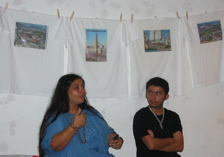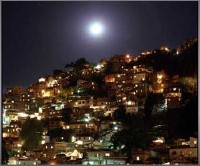
BRINQ is the home of entrepreneur and product designer Patrick Donohue, whose work focuses on high impact startups and products.
I've been very happy with how far my Portuguese has come, especially after having been gone from Brazil for so long, yet my ability to communicate here is like being able to swim in a gentle sea, enquanto tudo tá tranquilo, tudo bom! ("While everything is calm, no problem!") But while sitting in on CatComm's open forum, a meeting for feedback from community partners and constituents, I experienced a very different world of linguistic aquatics; visualize the crashing waves at Ipanema, Brazil's most famous of beaches, where the people are beautiful but the weak stay out of the water.
Last night, a dozen of us met inside the Casa do Gestor Catalisador, CatComm's home and technology hub in Rio, located on the edge of the downtown, in a historic district by the bay and the center of the old slave trade. Around us on the Casa walls, on mounted wood or printed t-shirts, hung windows into the world of the favelas, the works of Brazilian photographer MaurÃÂcio Hora, a man with an incredible capacity to capture the spirit of place on film. MaurÃÂcio sat to my left, Theresa to my right, the rest were spread out in a circle around the room, community leaders and artists, passionate Brazilians all; not quite what my beach and bar Portuguese had prepared me for.
 It wasn't so bad at first, when Theresa began speaking I was able to follow along, she had prepped me before hand (in English) about the proposal she would present, about CatComm's new strategy for partners and growth. Muito tranquilo. However once people started responding, once bodies leaned forward and hands started churning, my bearings slipped out from under me and the sea became choppy. At times I would grasp the topic of the conversation and understand its flow, but then just as suddenly a new wave of words, sounds, and Brazilian passion would descend upon me, and my head would be plunged into the deep, tumbling out of control and comprehension lost, finally clawing my way to the surface only to think "Meu Deus, como a gente veio pra cá" "How the heck did we end up here?"
It wasn't so bad at first, when Theresa began speaking I was able to follow along, she had prepped me before hand (in English) about the proposal she would present, about CatComm's new strategy for partners and growth. Muito tranquilo. However once people started responding, once bodies leaned forward and hands started churning, my bearings slipped out from under me and the sea became choppy. At times I would grasp the topic of the conversation and understand its flow, but then just as suddenly a new wave of words, sounds, and Brazilian passion would descend upon me, and my head would be plunged into the deep, tumbling out of control and comprehension lost, finally clawing my way to the surface only to think "Meu Deus, como a gente veio pra cá" "How the heck did we end up here?"
The Brazilian love of talking on top of one another means a whole different set of cultural cues apply here, how do you tell if someone is staying civil and respectful, how do you tell what is a constructive conflict and what is not? Brazilians are a passionate people and many debate with animation and emotion, loudly at times, which are all traits that I can relate well to. How many times in Kenya did it appear that Erik and I were about to come to blows, when in fact, we were only just getting warmed up?
However it's clear that for us to do Protocol work here, guiding a creative collision of world-views, will require a lot of preparation, both in our language and in our ability to train and support other people. The language barrier makes proactive leadership absolutely necessary. I can continue to improve my Portuguese, but the only effective way forward is to make sure that more appropriate people know what they're doing and supporting them, there's no other choice. Which, if you think about it, is really the only way our work in the Base of the Pyramid can come alive, working with others, training new people, supporting them, and then to some degree, letting go. It's hard to imagine us doing here exactly what we did in Kenya: Erik, and I directly facilitating exercises and discussions. Here we would have to plan for miscommunication, slow down for better understanding. Though in truth we did not always understand what was going on in Kenya either, our Kiswahili was worse than my Portuguese, and patience was always key.
 It's funny to think about what has become one the defining aspects of my life, the constant search for uncomfortable situations and new things to be ignorant about. There's something a little crazy about that, something a little strange about someone who has to go so far from what he knows to find meaningful work, to feel content yet not comfortable. I suppose it's all a search for meaning and growth and as Erik loves to say, "If what you're doing feels comfortable, then you're probably not doing something new!" Optimal ignorance is another phrase we love to throw around: optimal is when you know enough to be respectful, but not enough to know what is impossible. You're able to do things in someone else's backyard that you could never do in your own. You just don't know enough not to try. A clueless gringo has his uses after all, but at the very least he does need to learn to keep his head above the water.
It's funny to think about what has become one the defining aspects of my life, the constant search for uncomfortable situations and new things to be ignorant about. There's something a little crazy about that, something a little strange about someone who has to go so far from what he knows to find meaningful work, to feel content yet not comfortable. I suppose it's all a search for meaning and growth and as Erik loves to say, "If what you're doing feels comfortable, then you're probably not doing something new!" Optimal ignorance is another phrase we love to throw around: optimal is when you know enough to be respectful, but not enough to know what is impossible. You're able to do things in someone else's backyard that you could never do in your own. You just don't know enough not to try. A clueless gringo has his uses after all, but at the very least he does need to learn to keep his head above the water.
Time to go swimming again.
***
Notes for the unfamiliar:
Comments
[...] Learning to Swim - Back in Brazil
[...] Learning to Swim - Back in Brazil [...]
The Power of Peer Networks -
The Power of Peer Networks - Individuals vs. Scale
Posted to the BRINQ Workshop - about CatComm, PledgeBank and replication vs. scale.???Everybody knows the proverb about how it???s better to teach a man to fish than just to give him a fish, but there???s a step beyond that: it???s better that a man???s
The Power of Peer Networks - CatComm
The Power of Peer Networks - CatComm and PledgeBank
???Everybody knows the proverb about how it???s better to teach a man to fish than just to give him a fish, but there???s a step beyond that: it???s better that a man???s neighbor is the one teaching him to fish, his peer. If some expert swoops in fro...
Finding the Hard Answers - Catalytic
Finding the Hard Answers - Catalytic Communities Launches Upgraded Site
Catalytic Communities (CatComm), our community partner in Rio de Janeiro, Brazil, announced the launch of its new community empowering site www.CatComm.org. CatComm is a huge inspiration for us here at BRINQ, their insights in cultivating and capture l...
Learning to Swim - Back in Brazil
Learning to Swim - Back in Brazil
Originally po